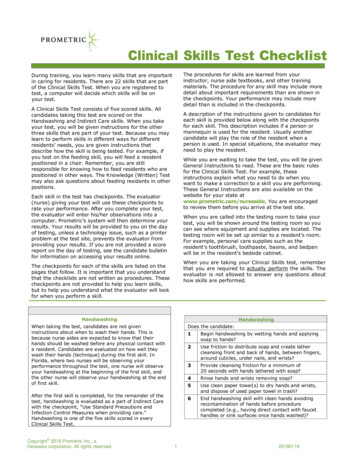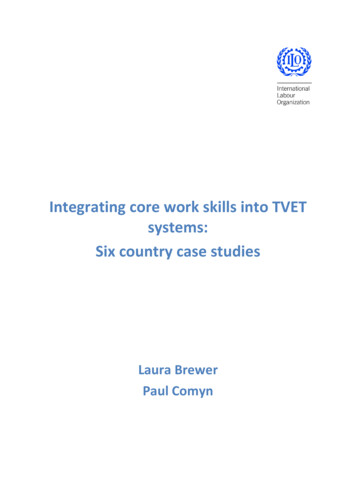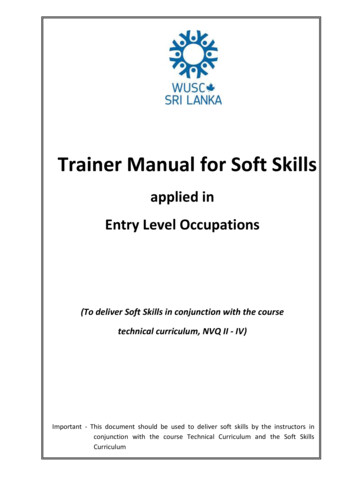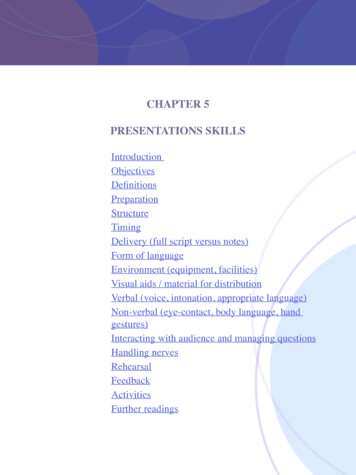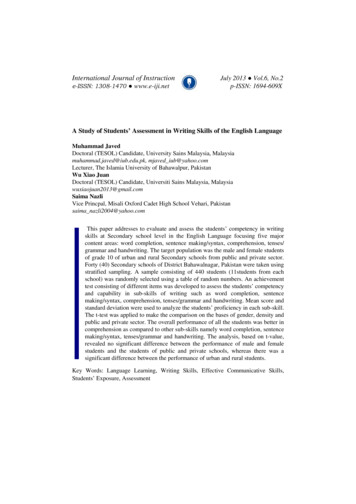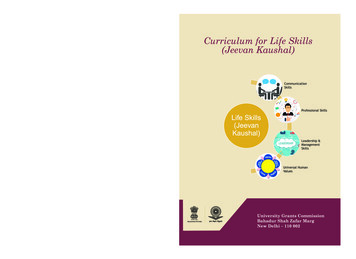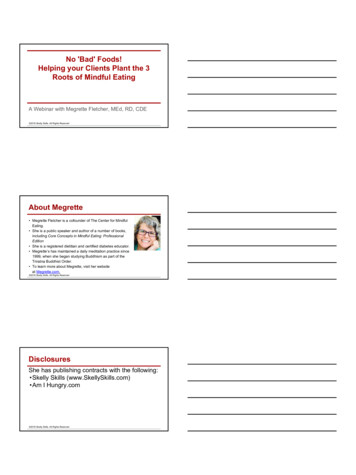
Transcription
No 'Bad' Foods!Helping your Clients Plant the 3Roots of Mindful EatingA Webinar with Megrette Fletcher, MEd, RD, CDE 2016 Skelly Skills. All Rights ReservedAbout Megrette Megrette Fletcher is a cofounder of The Center for MindfulEating. She is a public speaker and author of a number of books,including Core Concepts in Mindful Eating: ProfessionalEdition She is a registered dietitian and certified diabetes educator. Megrette’s has maintained a daily meditation practice since1999, when she began studying Buddhism as part of theTriratna Buddhist Order. To learn more about Megrette, visit her websiteat Megrette.com. 2016 Skelly Skills. All Rights ReservedDisclosuresShe has publishing contracts with the following: Skelly Skills (www.SkellySkills.com) Am I Hungry.com 2016 Skelly Skills. All Rights Reserved
Learning ObjectivesAt the conclusion of this webinar, the learner will be ableto:1. List the Three Roots of mindful eating2. State three counseling benefits of including theRoots of Mindful Eating into your counselingpractice.3. Understand how to use the counseling activity "NoBad Foods" 2016 Skelly Skills. All Rights ReservedWhat isMindful EatingUnderstanding the basics of mindful eatingSimple Definition of Mindful EatingCan be initially understood ifyou explore the definitions ofthe two words that define thisapproach. Mindful Eating awareness eating. 2016 Skelly Skills. All Rights Reserved
Is Mindful Eating Helpful? Mindful Eating does not promote psychological, emotional, orphysical problems. Research shows that Mindful Eating actually heals thepsychological, emotional, or physical harm caused by restrictiveeating. Mindful Eating facilitates the healing of your relationship with food.Scientific Benefits of Mindful EatingDecrease portions, Decrease food cravings, Decrease emotionaleating, Decrease binge- eating behavior, Decrease depression andanxiety, Decrease emotional stress, Decrease automatic or habitualbehavioral response to food, Improve food selection, Increase a senseof autonomy and control surrounding food and eating choices,Improve body image, Improve stress management and more todiscover.Mindful Eating in Nutrition Counseling for Eating Behavior: What Research Suggests. Today’s Dietitian 2016 2016 Skelly Skills. All Rights ReservedPoll QuestionIs Mindful Eating HAEScompliant?
Mindful Eating is HAES compliantTCME paper on Weight ConcernsTCME does not endorse any philosophy or program that includes or promotesweight loss measures or procedures because evidence does not support thatit deepens or improves an individual’s mindful eating practice.The intention of mindful eating is to remain in the present moment bypromoting acceptance, nonjudgment, and curiosity about an individual’sdirect experience. It is not outcome-based and does not promote any specificbody shape or size.The Center for Mindful Eating Position Statement on Weight Concerns“The greatest benefit of Mindful Eating— that it does not cause harm – iswoefully underreported.”Megrette Fletcher M.Ed., RD, CDE
3 Roots of Mindful Eating1. Nonjudgmental observation,2. Meditation, and3. Self-kindness 2016 Skelly Skills. All Rights ReservedRoot 1:NonjudgmentalObservationTo observe without getting “hooked” by the juicy partsof life.Benefits of nonjudgment Acceptance may decrease stress by helping us let go of controland accept the facts. Nonjudgment may make us happier by cutting out secondaryemotions (e.g., getting angry because we’re anxious; feeling guiltybecause we’re depressed) and the stories we tell ourselves aboutcertain experiences.” Seeing unpleasant or difficult situations for exactly what they are -without getting wrapped up in our stories about the situations —allows us to use them as opportunities for growth.”
Benefits of nonjudgment cont. Multiple (non-mutually exclusive) mechanisms have beenproposed: greater appreciation of life via increased present-momentawareness; greater productivity as a result of improved attention; the joy and ease generated by acceptance and nonjudgment; a decrease in the self-discrepancy gap.”Roberts, of the MindSpace Clinic in QuebecConnect with Judgment“That last dietitian I met was at rehab, but I got the feelingshe didn’t believe me. Like she thought I was lying when Itold her I wasn’t hungry.”Would you label it Pleasant, Neutral, or Unpleasant?Connect with Judgment Now, imagine a specific person youassociate with this feeling of beingjudged. Imagine this person is going to teachyou how to take care of yourself. This person is going to explain howto change your diet, eating, oractivity.
Connect with Judgment Now imagine thatthe person doingthe judging isyourself.Debrief this activity What worked aboutthis empathy activity? In your chat windowtype your reply What wasn’t effective?Type your replyNo Bad FoodsReview the handout called: There are No “Bad”Foods.In this handout consider how removing foodjudgment in your counseling might be helpful.
Debrief this activity What worked aboutthis handout? In your chat windowtype your reply What would youchange? Type yourreplyRoot 2:MeditationThink of this as “Lab work” for lifeMeditation Benefits The clarity and sense of ease that can bedeveloped in meditation helps us to avoidjudgment, which can overwhelm oroversimplify our relationship to food andeating.
Over time, meditation helps usdevelop greater capacity forpresent-moment awareness andcompassionate responses to life.Comparison for ConsiderationCompare thejob of thebladder andthe job of yourmind.Question It is normal to notempty your bladder?Is it pleasant to notempty your bladder?
Question Is it “normal” tonot empty yourmind?Is it possible to“hold” all theinformation in?Debrief this activity What worked aboutthis comparison? In your chat windowtype your reply What didn’t work orwhat questionsremain? Type yourreplyRoot 3:Self-kindnessThink of this as “motivation” necessary for life.
Three Aspects of Self-compassion3 aspects ofSelf-compassion Self-kindness CommonHumanity MindfulnessKristin Neff, Self-compassionExamples of Self-compassionWhen a client is Self-critical Choosing isolation Engaging inover-identificationOffering Self-compassion Self-kindness Common Humanity MindfulnessDebrief this activity What worked? List three things. What would you change? 2016 Skelly Skills. All Rights Reserved
Key Points to Remember Mindful Eating awareness eating. Mindful Eating is HAES compliant The 3 Roots of Mindful Eating are: Nonjudgmental observation, Meditation, and Self-kindness has 3 parts: Self-kindness, Common Humanity, Mindfulness 2016 Skelly Skills. All Rights ReservedMore On This Topic Thank you for attending! www.megrette.com Download a free ebook, 3 Roots of MindfulEating (sign up to learn more about CoreConcepts in Mindful Eating) Learn more about mindful eating and The CoreConcepts for Mindful Eating: Professional Editionvisit www.skellyskills.com. 2016 Skelly Skills. All Rights ReservedCitations Burggraf, Frederick, and Megrette Fletcher. Discover Mindful Eating: A Resource ofHandouts for Health Professionals. Arlington VA: Skelly, 2010. Print."The Center for Mindful Eating - Weight Concerns." The Center for Mindful Eating Weight Concerns. The Center for Mindful Eating, n.d. Web. 28 Jan. 2017.Fletcher, Megrette. The Core Concepts in Mindful Eating: Professional Edition.Epping: Self-publisher, 2017. Print.Hudnall, Marsha. "Mindful Eating in Nutrition Counseling for Eating Behaviors:What Research Suggests." Today's Dietitian Jan. 2016: n. pag. Web.Neff, Kristin. Self-compassion: Stop Beating Yourself up and Leave Insecuritybehind. New York: William Morrow, 2011. Print.
Is Mindful Eating Helpful? Mindful Eating does not promote psychological, emotional, or physical problems. Research shows that Mindful Eating actually heals the psychological, emotional, or physical harm caused by restrictive eating. Mindful Eating facilitates the healing of your relationship with foo
